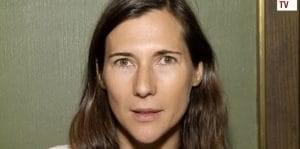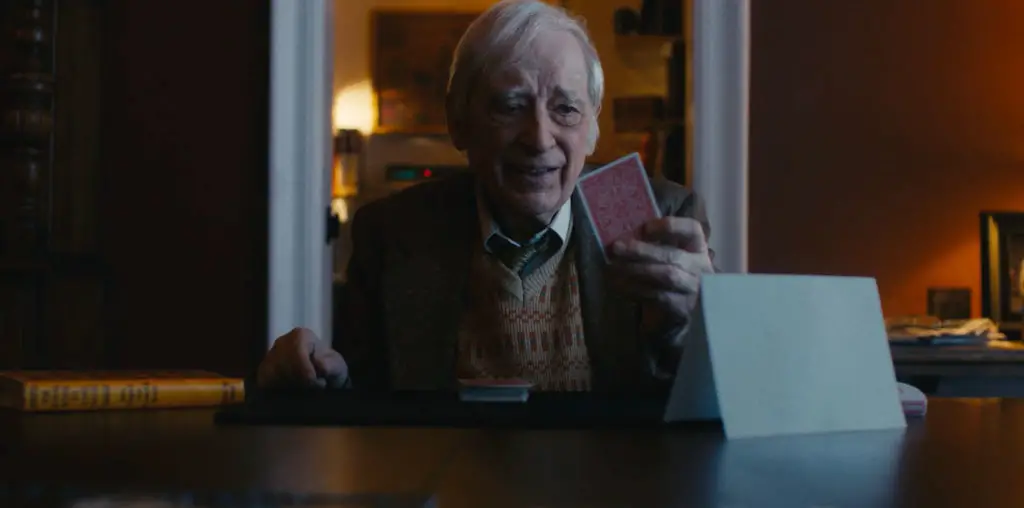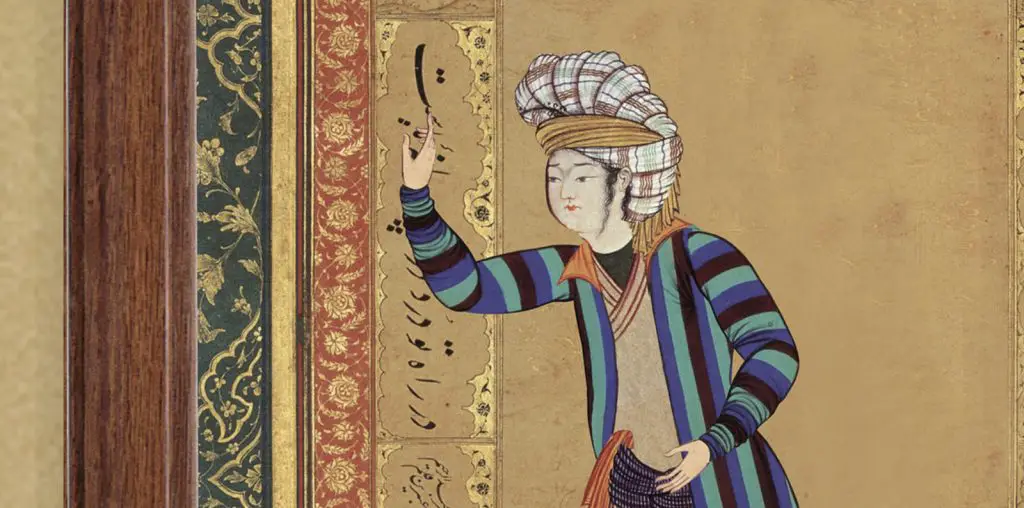
The film “Cold Souls” is surprising in its uniqueness and humor. Coming from a first-time filmmaker, Sophie Barthes, one would expect something a little more amateur, but “Cold Souls” is anything but. The film tells the story of an actor, Paul Giamatti (played by, yes, Giamatti), who finds his soul far too heavy to carry anymore. Luckily for him, there is a New York company willing to store Paul’s soul, and relieve him of his burden (which appears in the form of a chickpea) while he can roam around soulless and free. With the release of her film on August 7th, Sophie Barthes has been busy lately, and she’s had plenty to talk about. This past week I got a chance to talk to her a little about her movie. “Cold Souls” is hilarious, Sophie is delightful, and I can’t wait to see the movie again!
“I use my dreams quite a lot in my writing process. I try to write them down every day.”
You have said that the idea for “Cold Souls” came from a dream you had. Could you tell us a little about that dream and the process of transferring your dream thoughts to a fully fleshed out idea?
It was a very strange and funny dream. I’m waiting in line in a doctor’s office, holding a box, like everybody else in line. Our souls have been extracted and a doctor will examine it and assess its problems. Woody Allen is also in line, in front of me. When his turn comes, he opens his box and discovers that his soul is a just a little chickpea! He is furious. At this point, I feel extremely anxious. I look down at my container but the dream ends. I never saw the shape of my soul.
I use my dreams quite a lot in my writing process. I try to write them down every day. Sometimes they are very narrative like this one, sometimes they are just impressions or sensations. But this particular dream seemed to be a very absurdist premise for a play or a screenplay. I had just seen Woody Allen’s “Sleeper” a few days before. Maybe that’s why the dream felt like a scene from a film.
I developed the script from this particular scene and started to imagine the rules of the Soul Storage and the soul trading world. My intention was to maintain a strange dreamlike or nightmarish logic throughout the film. So the story doesn’t function at a rational or logical level. Paul wakes up many times in the film and he says at one point: “It’s a nightmare, it’s a total nightmare!” And that’s what literally the film is…a weird dream.
It seems that your previous work has been in the short film format. Besides a longer work schedule, how is shooting a feature different from shooting a short film? Did you find this process more rewarding?
Yes, I only made two short films before this with my life and creative partner, cinematographer Andrij Parekh. I love the short film format, but it’s a difficult exercise. Making a first feature film is a long, sometimes painful road – it can get emotionally draining but at the same time it’s a rewarding process. But there is a certain amount of pressure and you have to be responsible to your investors for while trying to maintain some artistic integrity. Short films are often self-financed so you enjoy a much higher level of creative freedom. Making a film is a very similar to childbirth: a long gestation period with ups and downs. Finally, when the film is born, you have to love it regardless of its imperfections and then it’s out in the world…and before you know it, this child becomes a moody zitty teenager!
In the film, Paul Giamatti plays “himself.” Does that mean he’s as neurotic as the characters he plays? Is his character in “Cold Souls” pretty accurate?
Oh no, thanks god! He is not like this in real life. He has a great sense of humor. He is quite sarcastic. He is very sharp and humble, not self-involved and neurotic like the character in the film. In “Cold Souls,” he is just playing a variation on a persona, in the tradition of the typical New York neurotic actor (Woody Allen, Wallace Shawn, etc.). The idea was to draw from his persona in “American Splendor” and “Sideways.” But Paul is an extremely versatile actor – he can do anything.
“He had this blend of neurotic, agitated, grumpy qualities mixed with a very soulful presence on screen.”
Did you initially write the script with Giamatti in mind? Or did you rewrite after casting? How did he become attached to the project?
Initially, I entertained the idea to write it for Woody Allen, since he was present in the dream. But I realized it wasn’t realistic. Then I saw “American Splendor” and thought Paul Giamatti would be perfect. He had this blend of neurotic, agitated, grumpy qualities mixed with a very soulful presence on screen. So I decided to write it for him. By a strange twist of fate, I met him at the Nantucket Film Festival. I was there to get an award for the script and he was there to give an award to Alexander Payne and Jim Taylor for “Sideways.” I told him the dream and a little bit about the script. The following week he read it and luckily he liked it.
This being your first feature, how did you feel about getting into the Sundance Film Festival?
I attended the Sundance Screenwriters and Directors lab in 2007 with “Cold Souls,” and my short film “Happiness” also played in competition at Sundance. So I guess I was already part of the Sundance family! I’m very grateful to Sundance, they have been really supportive and instrumental in helping me getting this film out in the world.
“Without Sundance a lot of independent filmmakers wouldn’t be able to survive in this film industry…”
How was your reception at Sundance? Did you pick up distribution while you were there? How did you feel about the festival in general? (I, for one, find it way too cold. And I’m from Utah.)
We got a great reception at Sundance. I was pretty nervous given the economic climate and hoping we would sell the film. I think only 11 films were sold this year at Sundance. We started negotiations during the festival, but closed the deal with Samuel Goldwyn the week after the festival. I’m very happy they picked the film. They’ve done an incredible job so far, a very creative campaign.
Without Sundance a lot of independent filmmakers wouldn’t be able to survive in this film industry. Oh yes, it’s cold there, but after shooting in the middle of winter in Russia, nothing seems too cold!
I noticed that being without a soul in your film seems a lot like being high. Tell me, Sophie Barthes, am I right? (Incriminating!!)
Ha ha! Well you’re not that far off. The idea is that soul extraction is the next step after Prozac. So it’s very close to taking a pill that numbs your sensibility. I feel that all the medication we’re taking to feel good is very close to a sort of anesthesia of the soul. The film is a satire of modern occidental medicine.
There are also some very interesting spiritual aspects of losing your soul. While being able to extract your soul scientifically may seem like an atheistic idea, I don’t think the film is necessarily “godless.” Could you comment on the spirituality of the film?
Well, I hope it’s a spiritual film. But there is a distinction between spirituality and religion. You can be a spiritual person and believe in the existence of the psyche or soul without adhering to the dogma of a particular religion. The most important thing for me is that the film is not dogmatic. The film is not there to give a definition of what exactly the soul is, and this is intentional. I truly believe that no one knows exactly what the soul is and what makes us human. After dedicating his life to the analysis of the human psyche, Carl Jung said something very beautiful: “I’m surprised, disappointed, happy about myself, in distress, depressed and delighted…all this at the same time and I can’t add it up…I don’t have any certitudes.” I think that’s a wise attitude, to know that you don’t know. That’s why in the film, whenever a character asks a question about the soul, the answer is “I don’t know!” I think you have be out of your mind to pretend that you know for sure what the soul or psyche are. It’s a mystery. So the metaphor in the film is just that the soul could be a mysterious and strange muscle with layers, a sort of impressionistic tissue of feelings, moods, dreams, and inaccessible memories that constitute our sensibility and essence. And you can neglect it and let it shrink or try to develop it. That’s what the film is trying to convey and my only hope is that the audience leaves the film asking themselves some questions: What is the soul? Do I have a soul? How do I treat my soul every day?
I find it very strange and funny that some audience members and even sometimes journalist complain and say: “Oh but you haven’t defined what the soul is exactly!” I’m not a priest, I’m a filmmaker! I can’t spoon-feed answers to an audience. That would be immoral. Even a philosopher would not give you a definitive answer because the purpose of philosophy is to raise questions. What is interesting is to take a look at different philosophical traditions (from the Greeks to modern philosophy), religions, psychoanalysis, and see how the concept of the soul has evolved.
Al Pacino’s soul in the film is a source of many hilarious jokes. Are you trying to get a copy to Pacino?
Well, I hope he’ll see the film! I’m a big fan.
“I’ve heard that there is a sort of glass ceiling for female directors in this country, but I didn’t hit it yet!”
Have you run into any problems as a female filmmaker in a largely male-dominated industry? In “Cold Souls,” you center the story on a male protagonist. Did you find writing/directing a male character difficult in any way?
So far I’ve been lucky I haven’t encountered any bias. I’ve heard that there is a sort of glass ceiling for female directors in this country, but I didn’t hit it yet! Also I’m very lucky to be living and working with Andrij Parekh. We work as a creative team and he protects me a lot. He has much more experience than me. He shot 14 features. He knows how the psychology of the film industry works.
I wrote the lead as a male character intentionally, so that I can hide a lot of myself behind this character. It’s quite liberating – there is no self censorship.
A film like “Cold Souls” doesn’t seem to fit into any specific genre. It’s science fiction, but it’s also a comedy, a drama, and a thriller. Did you have any outside influences (films, books, paintings, music, etc.) that influenced your filmmaking?
That’s another thing that drives me a bit nuts in this country: the necessity to categorize everything. It’s “this film” meets “that film.” I’ve never heard that anywhere else abroad. If people have difficulties to take a film for what it is, they need to reference it immediately to other films – maybe it make them feel safer. I’ve heard everything for Cold Souls: It’s “Being John Malkovich” meets “Vanilla Sky”!
I’m very influenced by Surrealism as a movement (film, painting, literature, poetry: Luis Buñuel, Boris Vian, André Breton, Dali, Max Ernst) and the Theater of the Absurd (Eugène Ionesco, Samuel Beckett, Jean Tardieu). I grew up mainly reading this kind of literature.
Some influences for the film: Woody Allen’s “Sleeper”, Jean Luc Godard’s “Alphaville”, Luis Buñuel’s “The Discreet Charm of the Bourgeoisie” and George Lucas “THX 1138.” Maybe it sounds cliché but my favorite filmmakers are Fellini and Bergman. I particularly like Bergman “Persona,” “The Silence” and “Hour of the Wolf.” I also love David Lynch. And, of course, Woody Allen, who has a one-bedroom apartment in my subconscious, I think!
Originally posted on August 24, 2009.


